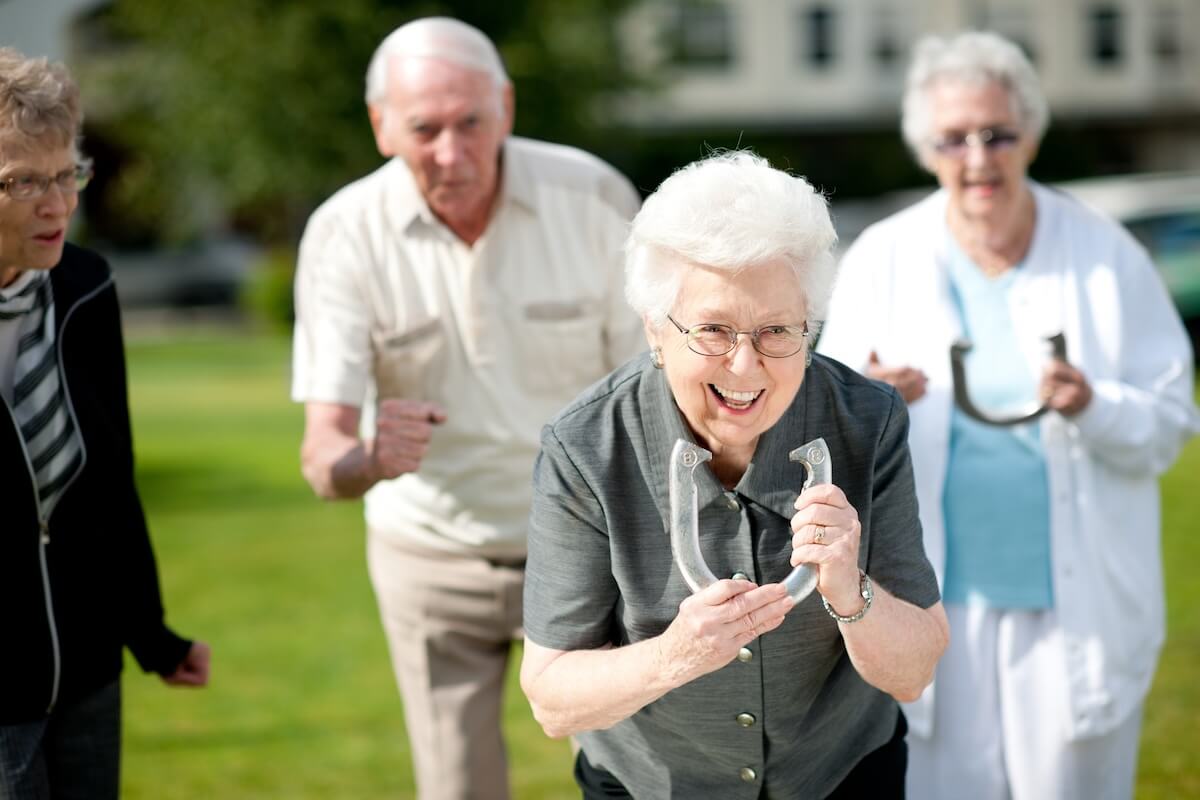We're Dedicated To Ensuring Seniors Live Their Best Life
Engaging Activities to Keep Seniors’ Minds Sharp

Aging brings many changes, and for some seniors, cognitive skills like memory, problem-solving, and critical thinking might not be as sharp as they once were. This is entirely normal, but many seniors feel frustrated when their memory begins to fade.
Have you noticed your loved one forgetting little details, like the name of a longtime friend or where they put their keys? While changes in cognitive function can be challenging, the good news is that there are plenty of enjoyable ways to help senior minds stay active and healthy. You can work with your senior loved one to find activities that you enjoy doing together while also supporting their cognitive health.
With the right activities, seniors can nurture mental agility while having fun. The Landings of Canton Hills shares a closer look at engaging pastimes that stimulate cognitive skills, foster creativity, and bring joy to their daily routines.
Why Cognitive Activities Are Essential for Seniors
Cognitive skills are the foundation of how we process, learn, and recall information. These skills play a role in thinking, speaking, reading, remembering, and solving problems. Just like physical exercise keeps the body fit, exercising the brain is vital for maintaining mental sharpness. When cognitive skills begin to decline, many seniors feel frustrated. This can lead to giving up activities that they once loved, which can cause a domino effect of further negative decline.
For seniors, mental stimulation can help mitigate cognitive decline and improve quality of life. These activities are more than just pastimes—they’re tools to keep the mind active, foster social interaction, and enhance overall well-being. Below are activities that are both enjoyable and cognitively enriching, and that you can enjoy alongside your senior loved ones.
1. Express Creativity Through Arts and Crafts
Arts and crafts offer more than just a chance to create something beautiful—they actively engage the brain by stimulating problem-solving and fine motor skills. Spending time creating something tactile, like a quilt or a painting, allows seniors to express themselves while keeping their cognitive and physical abilities engaged.
Hobbies like woodworking, knitting, painting, or scrapbooking can inspire seniors to think creatively and contribute to their sense of purpose. Projects don’t have to be elaborate, either. Simple undertakings like decorating a photo frame or arranging flowers can deliver a sense of accomplishment. Plus, handmade items make meaningful gifts that bring joy to loved ones!
Encourage seniors to explore their interests—whether it’s learning a new artistic skill or continuing a familiar passion. If you can, take your loved one to a craft or hobby store to explore their options. Assisted living communities often offer craft workshops, which are great opportunities to try new things and socialize. If possible, join your loved one for creative programs at their assisted living community so you can enjoy learning a new skill together.
2. Challenge the Mind with Trivia Games
For seniors, trivia games aren’t just entertaining — they’re fantastic for memory recall and sparking conversation. From questions about classic movies to pop culture or historical events, trivia encourages seniors to tap into the knowledge they’ve gathered over the years. It’s also a chance to learn new facts that can fuel curiosity. As you’re playing games with your loved one, look for opportunities to ask them to tell you stories about their lives.
Whether playing a casual game of Trivial Pursuit, enjoying themed trivia nights at an assisted living community, or finding online trivia resources, these games are highly versatile. Seniors can participate individually or as part of a group and discover the joy of reminiscing while keeping their brains active.
Pro tip: Customizable trivia games that focus on a senior’s specific era of life can provide a more personalized and meaningful experience.
3. Solve Puzzles for Relaxation and Stimulation
Few activities are as mentally rewarding as completing a puzzle. Whether it’s piecing together a festive jigsaw or filling out the perfect crossword, puzzles provide challenges that engage critical thinking and pattern recognition skills.
Seniors have a wide range of options to choose from, including large-print jigsaw puzzles and simpler word searches for those who may need added accessibility. Puzzles can be a private activity for quiet, relaxing moments, or a group project for family members to enjoy together.
Brain-teasing activities like puzzles challenge thinking abilities without overwhelming the participant, making them especially beneficial for cognitive health. If your loved one is struggling, ask them if they’d like to work as a team on a puzzle, and gently support them as they work their way through.
4. Put Problem-Solving Skills to the Test with Sudoku
Sudoku isn’t just a game of numbers—it’s a workout for the brain. This classic puzzle requires focus, strategy, and logic, all of which contribute to improved mental agility. With multiple difficulty levels, seniors can ease into Sudoku or challenge themselves progressively.
Not only does successfully completing a puzzle offer a sense of accomplishment, but books or online tools featuring these games are also affordable and easy to access. Sudoku makes for a wonderful daily mental habit to keep the brain sharp.
If Sudoku feels daunting at first, there are beginner-friendly grids available to help seniors get started. As your loved one improves, consider offering more challenging workbooks or arranging a friendly competition to see who can complete the puzzle faster.
5. Get Strategic with Board Games
Board games are fantastic for socializing and promoting mental flexibility. Strategic classics like chess or Scrabble enhance skills like problem-solving, memory recall, and vocabulary. Cooperative or competitive, these games create opportunities for seniors to connect with others while keeping their minds engaged.
For those who prefer lighter-hearted games, options like Sorry! or Monopoly offer equal amounts of fun and stimulation while encouraging laughter and bonding. Assisted living communities often organize game nights, turning board games into delightful group events.
Playing regularly can revive a love of competition while fostering creativity and focus. If you can, pick up a new board game every now and then and invite your senior loved one to play with you. Bring your own games to a senior living community game night and invite your loved one’s friends to participate as you compete against one another.

6. Explore Music and Dance
Engaging with music is a joyful way to activate the mind. Listening to favorite songs from the past often sparks cherished memories, especially for seniors living with memory challenges. Encourage seniors to explore genres they love or attend community performances. These activities nurture connections to the present and the past while promoting emotional well-being. Encourage your loved ones to share the stories that the songs bring up in their minds, to get a glimpse of what life was like in their younger years — and to encourage neural connections that can help to keep their minds sharp.
For those who are able, dancing adds an extra layer of engagement. It combines memory (recalling steps) with physical movement, providing a dual benefit for the body and brain. Whether it’s ballroom dancing or simply swaying along to a favorite tune, movement and music go hand in hand.
7. Elevate Everyday Life Through Socialization
Never underestimate the power of a heartfelt conversation. Regular social interactions are key to maintaining cognitive health. Conversing helps seniors engage their memory, recall names, and stay current with topics, all while feeling connected to others.
Joining group activities or having regular family check-ins gives seniors something to look forward to. Many assisted living communities offer opportunities to socialize daily, whether through book clubs, bingo, or communal meals.
If your loved one is able, invite them to join you at a gathering at your home. They’ll get to see family, make new friends, and enjoy social time with others. By staying connected, seniors avoid feelings of isolation and keep their brains active in an enjoyable, natural way.
8. Read, Learn, and Stay Curious
Reading is a timeless activity that works wonders for cognitive health. Whether it’s a riveting mystery novel, an inspiring biography, or a nostalgic children’s story, reading stimulates the brain and enriches the imagination.
Seniors might also enjoy audiobooks, which are a fantastic option for those who might experience eye strain. Beyond books, exploring new skills such as cooking a new recipe or learning a musical instrument keeps curiosity alive and encourages lifelong growth.
If possible, bring grandchildren or great-grandchildren with you to visit your senior loved ones, and have them read to each other to build connections, learn new things, and create a bond. With so many ways to learn and grow, seniors can truly make the most of every day.
Final Thoughts
For seniors, keeping the mind active is an enjoyable and essential part of aging well. From creative pursuits to problem-solving games, these activities not only support cognitive function, but also bring happiness and a sense of accomplishment. Whether they prefer quiet moments with a good book or lively interactions with loved ones over board games, these pastimes offer endless opportunities for joy and connection. When possible, spend time learning something new with your senior loved ones. They’ll enjoy the bonding experience, and you’ll get to know you’re doing your part to bolster their mental health and provide them with social connection.
If your loved one resides in an assisted living community, explore the programs and opportunities available to keep them engaged. Many of these activities can also be enjoyed at home with family members, making it easy to nurture mental agility without requiring extensive planning.
With a little encouragement—and the right set of engaging activities—you can help the seniors in your life continue to thrive and enjoy life with clarity and purpose.
Ready to explore how we can help your loved one live their best life? Let’s connect and discover the difference a supportive, engaging community can make.

